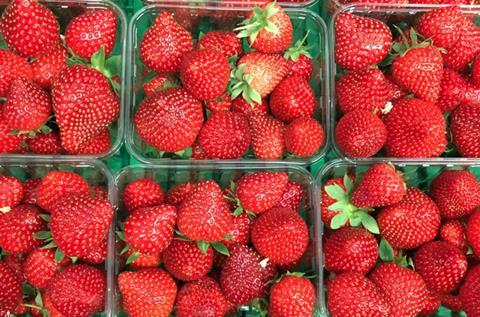
Italian fresh produce trade exhibition Macfrut, which has reverted to its previous position in the calendar ahead of Italy’s traditionally busy summer fruit trading period, is placing a major emphasis on strawberries as its nominated star product, with plans to blur the lines between consumer and commercial marketing with a series of special fringe events dubbed Strawberry Days. The prospects for growth in Italy's strawberry business are many, but the associated challenges similarly plentiful. As for the Italian export business at large, the product represents an enticing opportunity.
As many of Italy’s key fresh produce players and a host of international buyers prepare to return to Rimini for Macfrut on 10-12 May, several big questions remain. Can Italy differentiate itself sufficiently from its competitors on the international stage? Can the country’s exporters find enough buyers who are willing to pay a premium for their undisputed quality? Can its trade officials and politicians do enough to remove barriers to entry in emerging markets, including this year's Macfrut partner country China?
The international berry business certainly shows a lot of promise, and so strawberries should by rights offer Italy an excellent chance to shine. But the reality is that the country’s strawberry exports are down considerably on where they were in the past. In 2015, according to the latest available UN trade data, they were worth around €33.9m compared with €561m for Spain – giving Italy a 1.7 per cent share of the global strawberry export market, against Spain’s 44 per cent.
Ten years earlier, Italy sold €47m worth of fresh strawberries abroad, equivalent to 4.1 per cent of the overall export market, while Spain’s €472m sales equated to a 35 per cent market share. Go back another ten years and you start to understand how far Italy’s strawberry trade has fallen: its exports were worth approximately €110m in 1995, or 17 per cent of global export sales; in the same year, Spain’s €226.2m strawberry exports were less than half what they are now, even if they were still 39 per cent of the international market.
Future focus
Back in the present day, the hope for Italy’s strawberry industry is that growth in the domestic market, where sales have in fact increased over the past two years, can be replicated abroad in the very near future. Macfrut, for its part, is taking the opportunity to fly the flag for Italian strawberries by holding Strawberry Days, which will include various initiatives such as tasting sessions, exhibitions, promotions and a music contest dedicated to the fruit in Cesena and Rimini from 7-13 May. Coinciding as it does with the 50th anniversary of The Beatles releasing Strawberry Fields Forever, the get-together is also expected to feature Italian Beatles cover bands, not to mention a lot of fresh strawberries.
Italy’s strawberry production is concentrated in specific regions such as Basilicata, Campania, Emilia-Romagna, Veneto and Piedmont. The country can produce the fruit in several months of the year – they are grown in Sicily and in other areas in the south of Italy starting from January, before full production gets underway in May. In Emilia-Romagna and elsewhere, say Macfrut's organisers, strawberries are grown with minimal environmental impact using integrated production techniques, while organic production is said to be increasing each year. Basilicata, Italy’s primary strawberry growing region, is Macfrut 2017’s official partner region and, to mark the occasion, its representatives have organised a special visit to some of the most dynamic fruit and vegetable producers in the Metapontino area, as well as Matera, which will share the title of European Capital of Culture 2019 with Plovdiv in Bulgaria.
According to Renzo Piraccini, president of Macfrut organiser Cesena Fiera, the Strawberry Days initiative has been created with the aim of combining tourism, territory and agriculture with entertainment, vacation and well-being. Strawberries, which arguably more than any other fruit recall an image of freshness and of spring awakening, are seen as the ideal ingredient to create this bond.
“Strawberry Days is the result of a team effort, created in a short time by bringing together public and private parties, merging agricultural and tourism aspects,” he explains. “We have chosen strawberries for several reasons: it is the symbolic fruit of the 2017 edition of Macfrut and, in 2020, Rimini will host a major international strawberry symposium that is expected to attract a thousand researchers from all over the world. Strawberries also symbolise the revival of fruit and vegetables, previously in decline but now intensively produced by investing in high quality.”



